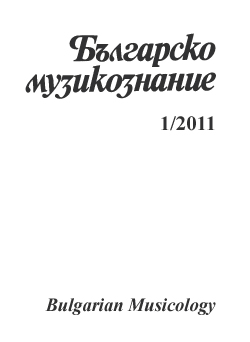Операта като духовната игра. Тан Дун – „Марко Поло“ (фрагменти)
Opera as a Spiritual Game. Tan Dun Marco Polo (fragments)
Author(s): Kapka LalovaSubject(s): Music
Published by: Институт за изследване на изкуствата, Българска академия на науките
Summary/Abstract: Tan Dun (1957), an American composer and conductor of Chinese origin, is one of the most distinguished figures on today’s music scene. The Chinese genetic code of his thinking comes through in the shamanic character of his Ghost Opera and On Taoism, and the sizhu style, originating in the teahouses of Southern China, “runs in his blood”. Tan Dun uses so called organic instruments, which enables him to work into the texture of the symphonic orchestra the sound of sand, stone, wood, paper (Paper Concerto), water (Water Passion) etc. In 1980, Tan Dun enrolled as a PhD student at Columbia University, New York, and subsequently sett led permanently in the city. There he discovered the music of Philip Glass, John Cage, Meredith Monk, and Steve Reich, with whom he collaborated. Dun’s experiments in the sphere of synthesis between different arts led him to multimedia, the theater, and film (Hero, Hidden Dragon). He derived great benefits from his relationship with John Cage and Toru Takemitsu, who brought him up to think as a citizen of the world. This is most evident in Dun’s best projects, which rest on the philosophy of Taoism, Buddhism, and Confucian order. Tan Dun’s thinking is thoroughly theatrical, and his inspiration comes mostly from Beijing’s Opera. His opera Marco Polo (1996, Muffathalle, Minich) does not off er any experiential or emotional identification with the Orient; it is a record of human empathy with man’s spiritual values; it spells co-existence rather than coexperience. Its libretto is a meeting point of Western avant-garde thought and the traditions of Eastern culture, the vehicle for this encounter being Marco Polo’s doubleedged – spiritual and physical – journey to the East. Building upon Paul Griffith’s libretto, Tan Dun undertakes his own musical journey. Thus there are three expeditions altogether – physical, spiritual, and musical – in the form of “opera within the opera”. The musical journey starts with a Renaissance dance refrain in parallel quints (medieval harp), then goes through a Gregorian choral, through the angelic voices of Mahler’s Song of the Earth (direct quote), a traditional Indian tune (sitar), a religious rite (Tibetan horn), a Mongolian song, and a lyrical pipa solo. Above all this ascends Beijing’s Opera with the atmosphere of its abstract character types – shadows and human souls moving around in Nature’s eternal cycle.
Journal: Българско музикознание
- Issue Year: 2011
- Issue No: 1
- Page Range: 41-49
- Page Count: 9
- Language: Bulgarian
- Content File-PDF

